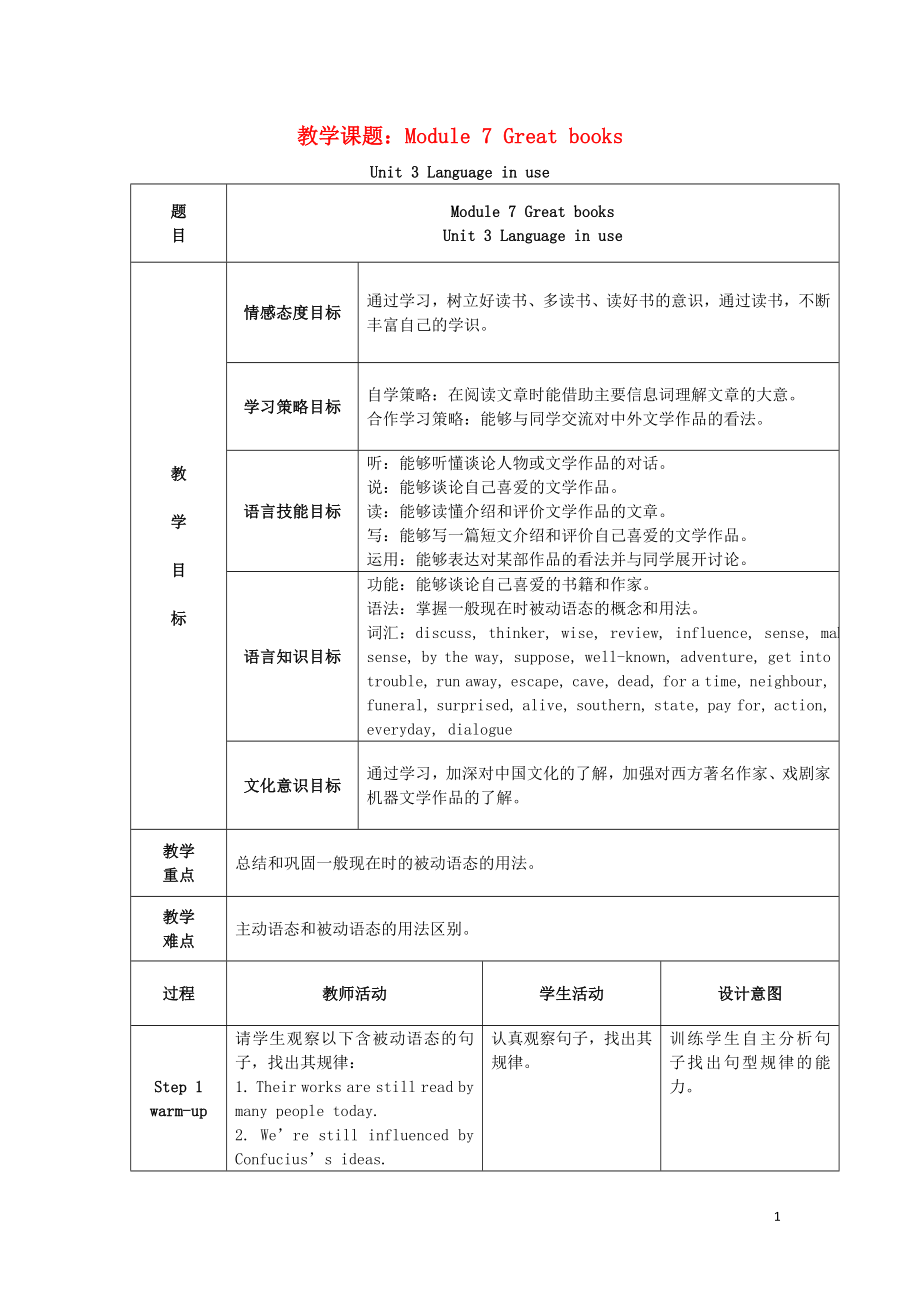《2019學(xué)年九年級英語上冊 Module 7 Great books Unit 3 Language in use教案 (新版)外研版》由會員分享��,可在線閱讀����,更多相關(guān)《2019學(xué)年九年級英語上冊 Module 7 Great books Unit 3 Language in use教案 (新版)外研版(3頁珍藏版)》請在裝配圖網(wǎng)上搜索。
1�����、教學(xué)課題:Module 7 Great books
Unit 3 Language in use
題
目
Module 7 Great books
Unit 3 Language in use
教
學(xué)
目
標(biāo)
情感態(tài)度目標(biāo)
通過學(xué)習(xí)����,樹立好讀書、多讀書�����、讀好書的意識�,通過讀書,不斷豐富自己的學(xué)識��。
學(xué)習(xí)策略目標(biāo)
自學(xué)策略:在閱讀文章時能借助主要信息詞理解文章的大意����。
合作學(xué)習(xí)策略:能夠與同學(xué)交流對中外文學(xué)作品的看法。
語言技能目標(biāo)
聽:能夠聽懂談?wù)撊宋锘蛭膶W(xué)作品的對話�。
說:能夠談?wù)撟约合矏鄣奈膶W(xué)作品�����。
讀:能夠讀懂介紹和評價文學(xué)作品的文章���。
2、寫:能夠?qū)懸黄涛慕榻B和評價自己喜愛的文學(xué)作品�。
運用:能夠表達(dá)對某部作品的看法并與同學(xué)展開討論。
語言知識目標(biāo)
功能:能夠談?wù)撟约合矏鄣臅妥骷摇?
語法:掌握一般現(xiàn)在時被動語態(tài)的概念和用法���。
詞匯:discuss, thinker, wise, review, influence, sense, make sense, by the way, suppose, well-known, adventure, get into trouble, run away, escape, cave, dead, for a time, neighbour, funeral, surprise
3����、d, alive, southern, state, pay for, action, everyday, dialogue
文化意識目標(biāo)
通過學(xué)習(xí),加深對中國文化的了解���,加強對西方著名作家����、戲劇家機器文學(xué)作品的了解��。
教學(xué)
重點
總結(jié)和鞏固一般現(xiàn)在時的被動語態(tài)的用法。
教學(xué)
難點
主動語態(tài)和被動語態(tài)的用法區(qū)別�。
過程
教師活動
學(xué)生活動
設(shè)計意圖
Step 1
warm-up
請學(xué)生觀察以下含被動語態(tài)的句子,找出其規(guī)律:
1. Their works are still read by many people today.
2. We’re still in
4�����、fluenced by Confucius’s ideas.
3. It is still read and loved by people all over the world.
4. The story is set in the town of St Petersburg, Missouri, in the US, in the nineteenth century.
5. It is written in everyday English.
6. It is thought to be one of the greatest American stories.
7. His
5�、plays are read by millions of people.
認(rèn)真觀察句子,找出其規(guī)律�。
訓(xùn)練學(xué)生自主分析句子找出句型規(guī)律的能力。
請學(xué)生根據(jù)剛剛的記憶和分析,完成填空:
1. Their works _____ still ______ (read) by many people today.
2. We _____ still ________ (influence) by Confucius’s ideas.
3. It ______ still _______ (read) and _______ (love) by people all over
6、 the world.
4. The story ______ ______ (set) in the town of St Petersburg, Missouri, in the US, in the nineteenth century.
5. It _______ ________ (write) in everyday English.
6. It _______ ________ (think) to be one of the greatest American stories.
7. His plays ______ _______ (read) by millions
7�、 of people.
根據(jù)剛剛的記憶和分析����,完成填空。
鞏固記憶和肯定學(xué)生的分析能力���。
Step2
引導(dǎo)學(xué)生小組合作分析和總結(jié)被動語態(tài)的用法規(guī)律。
在老師的引導(dǎo)下小組合作分析和總結(jié)被動語態(tài)的用法規(guī)律�。
訓(xùn)練學(xué)生根據(jù)自己的分析找出被動語態(tài)的用法規(guī)律��。
Step3
引導(dǎo)學(xué)生小組合作分析和總結(jié)被動語態(tài)與主動語態(tài)的區(qū)別���。
小組合作分析和總結(jié)被動語態(tài)和主動語態(tài)的區(qū)別��。
訓(xùn)練學(xué)生自己分析問題的能力找出被動語態(tài)和主動語態(tài)的區(qū)別���。
Step4
復(fù)習(xí)知識點和語法知識�,請學(xué)生分小組練習(xí)��,完成課本中的練習(xí)題����,并核對答案���。
復(fù)習(xí)知識點和語法知識��,分小組練習(xí)�����,完成課本中的練習(xí)題,并核對答
8����、案。
通過練習(xí)來鞏固本模塊中學(xué)習(xí)的知識和詞匯�。
板書設(shè)計
Module 7 Great books
Unit 3 Language in use
英語動詞有兩種語態(tài):
1. 主動語態(tài) 主動語態(tài)表示主語是動作的執(zhí)行者。
We plant trees.
2. 被動語態(tài) 被動語態(tài)表示主語是動作的 接受者��。
Trees is planted by us.
am
主語 + is+ 及物動詞的過去分詞+(by +動作執(zhí)行者)
are
動作 動作 動作
接受者 執(zhí)行者
作業(yè)
1. Finish the exercises in Learning English.
2. Preview the new words and expressions in Module 8
課后反思
3
 2019學(xué)年九年級英語上冊 Module 7 Great books Unit 3 Language in use教案 (新版)外研版
2019學(xué)年九年級英語上冊 Module 7 Great books Unit 3 Language in use教案 (新版)外研版

